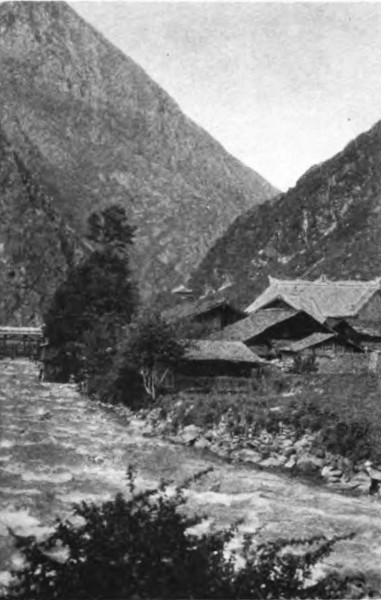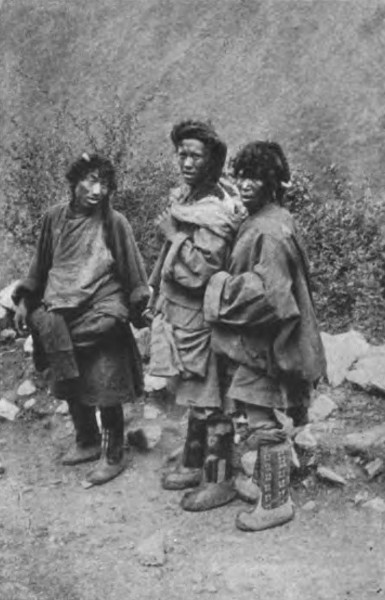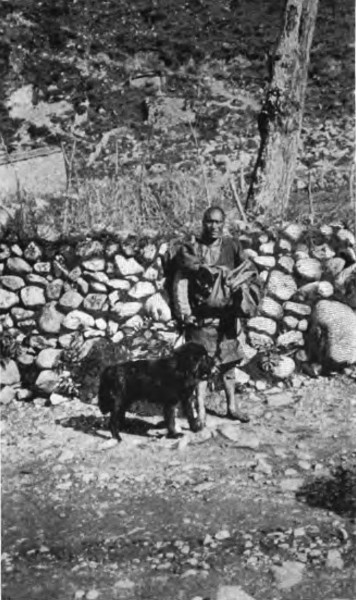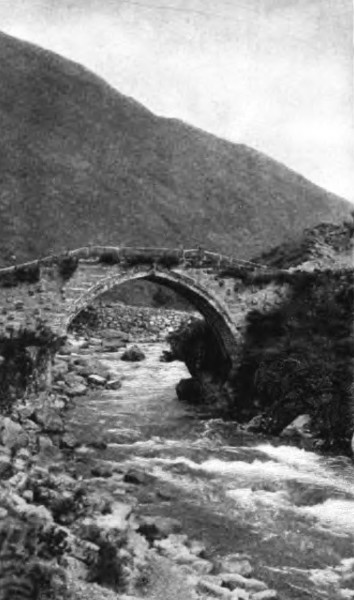| Web
and Book design,
Copyright, Kellscraft Studio 1999-2015 (Return to Web Text-ures) |
 (HOME)
|
|
CHAPTER VI TACHIENLU Tachienlu
is surely sui generis; there can be no other
town quite like it. Situated eight thousand four hundred feet above the sea, it
seems to lie at the bottom of a well, the surrounding snow-capped mountains
towering perhaps fifteen thousand feet in the air above the little town which,
small as it is, has hardly room to stand, while outside the wall there is
scarcely a foot of level ground. It is wedged into the angle where three
valleys come together, the Tar and the Chen rivers meeting just below the town
to form the Tarchendo, and our first view of the place as we turned the cliff
corner that here bars the gorge, was very striking, grey walls and curly roofs
standing out sharply from the flanking hillsides. Within the walls of Tachienlu, China and Tibet meet.
As we made our way through the long, dirty main street, here running parallel
with the Tar which comes tumbling down from the snow-fields of the Tibetan
range, I was struck at once by the varied aspect of the people. The dense crowd
that surged through the streets, some on horseback and some on foot, was more
Tibetan than Chinese, but the faces that peered out from the shops were
unmistakably of the Middle Kingdom. Groups of
fierce-looking fellows, clad in skins and felt, strode boldly along, their dark
faces bearing indelible marks of the hard, wild life of the Great Plateau. Many
of them carried weapons of some sort, for the Chinese have scorned to disarm
them. Among them walked impassively the blue-gowned men of the ruling race,
fairer, smaller, feebler, and yet undoubtedly master. It was the triumph of the
organizing mind over the brute force of the lower animal. Almost one man in
five was a red-robed lama, no cleaner in dress nor more intelligent in face
than the rest, and above the din of the crowd and the rush of the river rose
incessantly weird chanting and the long-drawn wail of horns from the temples
scattered about the town. Lamaism has Tachienlu in its grip, and I could have
fancied myself back in Himis lamassery, thousands of miles away on the western
frontier of Tibet. It was an extraordinarily picturesque scene, full of life
and sound and colour. Marco Polo described the territory lying west of
Ya-chou as "Thibeth," and a century ago the Chinese frontier stopped
at Tachienlu, but to-day Batang, a hundred and twenty-five miles to the west as
the crow flies, is the western limit of Szechuan. In actual fact, however,
direct administration by the Chinese stops at the Ta Tu, on the right bank of
the river the people being governed by their tribal chiefs. Tachienlu is in the
principality of the King of Chala, whose palace is one of the two or three
noteworthy buildings in the place, and the Tibetan population of some seven
hundred families, not counting the lamas, is directly under his authority. But
there is a power behind the throne, and the town is really governed by the
Chinese officials, for it is the key to the country to the west, and the
Imperial Government has long been awake to the importance of controlling the
great trade and military road to Lhasa. What the effect of the Revolution will
be upon the relations of China and Tibet remains to be seen. Already Chao Erh
Feng, the man who as Warden of the Marches had made Chinese rule more of a
reality in Lhasa than ever before, has fallen a victim to Manchu weakness;
hated by Chinese and Tibetan alike, he met his death at the hands of a rebellious
soldiery in January, 1912.  A VIEW OF TACHIENLU  TIBETANS Between Tachienlu and Lhasa
lie many hundred miles of barren, windswept plateaus
and perilous mountain passes. There are, I believe, at least ten of these
passes higher than Mont Blanc. Connection between the two places is over one of
the most difficult mountain roads in the world, yet it was by this route that
the Chinese finally conquered Tibet in the eighteenth century, and to-day most
of the trade goes the same way. Those who deny the Chinese all soldierly
qualities must have forgotten their achievements against the Tibetans, let
alone the still more extraordinary military feat of
their victory over the Gurkhas of Nepal, when a force of seventy thousand men
of the Middle Kingdom crossed the whole width of the most inaccessible country
in the world, and, fighting at a distance of two thousand miles from their
base, defeated the crack warriors of the East. The China Inland Mission has a station at Tachienlu,
but to my disappointment the two missionaries were away at the time of my
visit, and although their Chinese helpers made me welcome, providing a place
for me in one of the buildings of the mission compound, I felt it a real loss
not to talk with men who would have had so much of interest to tell. Moreover,
I had been looking forward to meeting my own kind once more after two weeks of
Chinese society. Fortunately another traveller turned up in Tachienlu about the
time I did, an English officer of the Indian army, returning to duty by a
roundabout route after two years' leave at home. As he too was installed in the
mission compound we soon discovered each other, and I had the pleasure of some
interesting talk, and of really dining again. Eating alone in a smelly Chinese
inn cannot by any stretch be called dining. I found that Captain Bailey had
gone with the Younghusband expedition to Lhasa, and was now on his way to
Batang with the hope of being able to cross Tibet from the Chinese side. We had
an enjoyable evening comparing experiences. I was impressed, as often before, by the comfort a man manages to secure for
himself when travelling. If absolutely necessary, he will get down to the bare
bones of living, but ordinarily the woman, if she has made up her mind to rough
it, is far more indifferent to soft lying and high living, especially the
latter, than the man. One thing I had, however, that Captain Bailey lacked, a
dog, and I think he rather envied me my four-footed companion. I know I
begrudged him his further adventure into the wilds beyond Tachienlu. Months
later I learned that although he did not reach Lhasa as he had hoped to do, his
explorations in the little-known region between Assam and Tibet and China had
won him much fame and the Gill Medal awarded by the Royal Geographical Society. Thanks to Captain Bailey I suffered no inconvenience
from the absence of the missionaries on whom I had relied for help in getting a
cheque cashed, as he kindly introduced me to the postmaster, to whom he had
brought a letter from the English post-commissioner at Chengtu, and this
official most courteously gave me all the money I needed for the next stage of
my journey. The Imperial Post-Office was in 1911 still under the same
management as the customs service, and was marked by the same efficiency. All
over China it had spread a network of post-routes, and by this time, unless the
Revolution has upset things, as it probably has, there should be a regular mail service between Tachienlu and Batang and
Lhasa. To be sure, the arrangements at Tachienlu were rather primitive, but the
surprising thing was that there should be any post-office at all. When I went
for my letters the morning after I arrived, I was shown a large heap of stuff
on the floor of the little office, and the interpreter and I spent a good
half-hour disentangling my things from the dusty pile, most of which was
apparently for members of the large French mission in Tachienlu. I was sorry
not to have a chance to meet representatives of the mission, which has been
established for a long time, and works, I believe, among both Tibetans and Chinese,
the Protestants confining themselves to the Chinese community. Nor was I more
successful in learning about the Protestant work, owing to the absence of the
missionaries on a journey to Batang. But I was greatly impressed by the truly
beautiful face and dignified bearing of a native pastor who called upon me at
my lodgings. Fine, serene, pure of countenance, he might have posed for a
Buddha or a Chinese St. John. In my limited experience of the Chinese, the men
who stand out from their fellows for beauty of expression and attractiveness of
manner are two or three Christians of the better class. Naturally fine-featured
and of dignified presence, the touch of the Christian faith seems to have
transformed the supercilious impassiveness of their class
into a serenity full of charm. It is a pity that it is not more often so, but
the zeal of the West mars as well as mends, and in imparting Western beliefs
and Western learning carelessly and needlessly destroys Eastern ideals of
conduct and manner, often more reasonable and more attractive than our own. The
complacent cocksureness of the Occidental attitude toward Oriental ways and
standards has little to rest on. We have reviled the people of the East in the
past for their unwillingness to admit that there was anything we could teach
them, and they are amending their ways, but we have shown and show still a
stupidity quite equal to theirs in our refusal to learn of them. Take, for
example, the small matter of manners, if it be a small matter. More than one teacher
in America has confessed the value of the object lesson in good breeding given
by the chance student from the East, but how few Westerners in China show any
desire to pattern after the dignified, courteous bearing of the Chinese
gentleman. I have met bad manners in the Flowery Kingdom, but not among the
natives. It had been a long, hard pull from Ning-yόan-fu; two
weeks' continuous travelling is a tax upon every one, but at no place had we
found comfortable quarters for the whole of the party, and as the men preferred
to push on, I was not inclined to object. But usually a seventh-day rest is
very acceptable to them; so we were all glad for a
little breathing-space in Tachienlu. The servants and coolies spent the first
day in a general tidying-up, getting a shave, face and head, and having their
queues washed and combed and replaited. Some also made themselves fine in new
clothes, but others were content to wash the old. As none of them, with the
exception of the fu t'ou, had ever been in Tachienlu before, they were as keen
to see the sights as I was, and in my rambles about the town the next two or
three days, I was greeted at every turn by my coolies, enjoying to the full
their hard-earned holiday. There was less to see of interest in Tachienlu than I
had expected. The shops are filled mainly with ordinary Chinese wares, and my
efforts to find some Tibetan curios were fruitless, those shown to me being of
little value. I imagine it is a matter of chance if one secures anything really
worth while. At any rate, neither the quaint teapots nor the hand
praying-wheels that I was seeking were forthcoming. Nor could I find any decent
leopard skins, which a short time ago formed an important article of commerce,
so plentiful were they. But at least I had the fun of bartering with the
people, whom I found much the most interesting thing in Tachienlu, and thanks
to the indifference or the politeness of the Tibetan I was able to wander about
freely without being dogged by a throng of men and boys. Chinese soldiers were much in evidence, for this is naturally an important
military post as well as the forwarding depot for the troops stationed along
the great western trade route to Batang and Lhasa. The Chinese population under
their protection, numbering some four hundred families, mostly traders, looked
sleek and prosperous. Evidently they made a good living off the country, unlike
the Tibetans who were generally dirty and ragged and poor in appearance. I must
confess that I was disappointed at the latter. In spite of their hardy,
muscular aspect and bold bearing, I did not find them attractive as do most
travellers. They lacked the grotesque jollity of the Ladakhis of Western Tibet,
their cousins in creed and race, and I met nothing of the manly friendliness
which marked the people of Mongolia whom I had to do with later. Never have I
seen men of more vicious expression than some I met in my strolls about
Tachienlu, and I could well believe the stories told of the ferocity shown by
the lamas along the frontier. Very likely the people are better than their
priests, but if so, their looks belie them. There is rarely a man or a people
so low as to lack a defender, and it is a pleasing side to the white man's
rule in the East, that if he be half a man he is likely to stand up for the
weak folk he governs. It may be due to pride of ownership, or it may be the
result of a knowledge born of intimate acquaintance, but whatever the cause, no
race is quite without champions in the white man's
congress. Captain Bailey who had had long experience of the Tibetans in
administrative work on the northeastern borderland of India, was no exception,
and he defended them vigorously. I had no knowledge to set against his, but
when he declared that they were a clean people it seemed to me he was
stretching a point, for I should have thought their dirt was as undeniable as
it was excusable in the burning sun or biting cold of their high plateaus. Practically all the traffic between China and its
great western dependency passes through Tachienlu, and the little town is full
of bustle and stir. From Tibet are brought skins and wool and gold and musk, to
be exchanged here for tobacco and cloth and miscellaneous articles, but tea, of
course, forms the great article of trade, the quantity sent from Tachienlu
annually amounting to more than twelve million pounds. Conspicuous in the town
are the great warehouses where the tea is stored, awaiting sale, and there are
numerous Tibetan establishments where it is repacked for the animal carriage
which here replaces the carrier coolies from the east. Among the Chinese the
trade is mostly in the hands of a few great merchants who deal with the women
representatives of the Tibetan priesthood who practically monopolize the sale
in their country, deriving a large income from the high prices they charge the
poor people to whom tea is a necessity of life. When I grew weary of the confusion and dirt of the
narrow streets I was glad to escape to the hillside above my lodgings. The
mission compound is small and confined, affording no room for a garden,
although fine masses of iris growing along the walls brightened up the severity
of the grey stone buildings; but a little climb behind the mission house
brought me to a peaceful nook whence I could get a glorious view over the town
and up and down the valley, here so narrow that it seemed possible to throw a
stone against the opposite hillside. The first fine morning after my arrival I made an
early start for the summer palace of the King of Chala, situated about eight miles
from Tachienlu in a beautiful, lonely valley among the mountains. This is the
favourite camping-place of Chengtu missionaries, who now and then brave the
eleven days' journey to and fro to exchange their hothouse climate for a brief
holiday in the glorious scenery and fine air of these health-giving uplands. We
were mounted, the interpreter and I, on ponies provided by the Yamen, one worse
than the other, and both unfit for the rough scramble. After traversing the
town, first on one side and then on the other of the river which we crossed by
a picturesque wooden bridge, roofed in but with open sides, we passed out at
the South Gate Tachienlu has no West Gate and found ourselves in a small suburb with a few meagre gardens. A mile farther
along we crossed the river again by a striking single arch bridge, known as the
"Gate of Tibet." We were now on the great trade route to Lhasa, but
between us and the mysterious city lay many days of weary travel. From time to time we met groups of Tibetans, men and
women, rough-looking and shy, with the shyness of a wild animal. Generally
after a moment's pause to reassure themselves, they answered my greeting in
jolly fashion, seeming quite ready to make friends. Occasionally the way was
blocked by trains of ox-like yaks, the burden-bearers of the snow-fields,
bringing their loads of skins and felt and musk and gold. Astride of one was a
nice old man who stuck out his tongue at me in polite Tibetan fashion.  LAMA AND DOG AT TACHIENLU  THE GATE OF TIBET After an hour's ride we left
the highway and turned into a beautiful green valley, following a very bad
trail deeper and deeper into the mountains, the soft meadows gay with flowers
forming a charming contrast to the snow-peaks that barred the upper end of the
valley. We came first to the New Palace, a large rambling building having no
more architectural pretensions than an ordinary Chinese inn. As the king's
brother, who makes his home there, was away, I saw nothing more of the place
than the great courtyard filled with mangy, half-starved dogs and unkempt men. Not far off is one of the great attractions of the
place, at least to the natives, a hot sulphur spring. To the disappointment
of my Tibetan guide I declined to visit it, preferring a leisurely cold lunch
on the bank of a rushing stream which was vigorously turning a large
prayer-wheel, a cylinder of wood inscribed many times over with the mystic
words of the Buddhist prayer, "Om mani padme hum," oftenest repeated
perhaps of all prayers. Each revolution of the wheel was equivalent to as many
repetitions of the words as there were inscribed on the wood. So night and day,
while the stream runs, prayers are going up for the king, and truly he needs
them, poor man, between the bullying of his Chinese overlords and the
machinations of turbulent lamas. Other indications of the Buddhist's
comfortable way of getting his prayers said for him are found all about
Tachienlu. From temple roof and wayside rock flags bearing the same legend wave
in the breeze, each flutter a prayer, and just outside the city we rode by a long
stone wall, much like those of New England, only its top was covered over with
inscribed stones. If you passed by, having the "mani" wall on your
right hand, each inscribed stone would pray for you; hence the trail always
forks to suit the coming and the going Buddhist, and I remember well the
insolent pride with which my Mohammedan servants always took the right hand when passing these walls in Ladakh. A mile farther up the valley we came to the Old
Palace, a collection of hovels banked with piles of manure. Far more attractive
than the royal residence were some tents not far off, where a band of Tibetans,
retainers of the prince, were encamped. They came out to greet us in friendly
fashion, pointing out a blind trail up the valley where we could get better
views of the snow-peaks; but we had to turn back, sorry though I was to leave
the spot, parklike in its beauty of forest and meadow, a veritable oasis in a
wilderness of rock and ice. It was more like home than anything I had seen in
West China, for there were stretches of fine, grassy meadows where the royal
herds of cattle were grazing, and all at once I realized that it was weeks
since I had seen a field of grass or real cows. It is the great lack in this
country. Pigs abound, and fowls, but there is no place for cattle, and the
horses live on beans and corn, or more likely on leaves and twigs. Priest-ridden Tachienlu boasts many temples and
lamasseries, and the last day of my stay I paid a visit to one of the largest,
not far from the South Gate. It was a wide, rambling, wooden building standing
near a grove of unusually fine trees, a sort of alder. The approach was not
unattractive, flowers growing under the walls and about the entrance. Once
inside the portal, we found ourselves in a large courtyard paved
with stone and surrounded by two-story galleried buildings. Facing us was the
temple, scarcely more imposing in outward appearance than the others. On one
side a group of half-naked lamas were gathered about an older man who seemed to
be relating or expounding something, whether gossip or doctrine I could not
tell, but I should judge the former from their expressions. They paid little
attention to us, nor did others strolling about the yard, but the big dogs
roaming loose were not backward in their greeting, although to my surprise they
did not seem at all ferocious, and treated my imperturbable little dog with
distant respect. Earlier travellers recount unpleasant experiences, but perhaps
the lamas have learned better in late years, and fasten up their dangerous dogs
if visitors are expected. Afterwards I saw in another inner courtyard a large,
heavy-browed brute adorned with a bright red frill and securely chained. He
looked savage, and could have given a good account of himself in any fight. While I was waiting for permission to enter the
temple, I inspected the stuffed animals dogs, calves, leopards suspended on
the verandah. They were fast going to decay from dust and moth, but I was told
that they were reputed sacred. The temple, which we were forced to enter from a
side door, was large and high, hung with scrolls and banners and filled with
images, but it was so dark that I found it difficult
to discern much save a good-sized figure of Buddha, not badly done. At the invitation of an old lama, a friend of our
guide, I was invited to a large, disorderly dining- or living-hall on the upper
floor, where we were very courteously served with tea, Chinese fashion. The old
man had a rather nice face, and I tried to learn a little about the place, but
conversation through two Chinese intermediaries, one speaking imperfect English
and the other bad Tibetan, was not very satisfactory, and I soon gave up the
attempt. I did succeed, however, in making the lama understand my wish to hire
some one to cut for me a praying-stone, to which he replied that there were
plenty outside, why did I not take one of them? I had thought of that myself,
but feared to raise a storm about my ears. Now, acting on his advice, I made a
choice at my leisure and no one objected. Under the double restraint of an
unusually strong prince, backed by Chinese officials, the priests of Tachienlu
are less truculent than farther west, but at best Lamaism rests with a heavy
hand upon the Tibetans; it is greedy and repulsive in aspect and brutalizing in
its effects; wholly unlike the gentle, even though ignorant and superstitious,
Buddhism of China. |